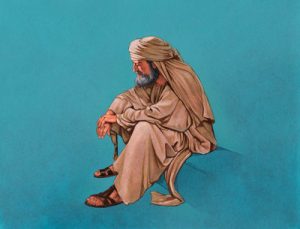Friday: Further Thought – Retributive Punishment
As said earlier in this quarter, it’s important to try to put ourselves in the place of the characters in the story, because doing so can help us understand their motives and actions. They didn’t see the battle going on behind the scenes as we do. If we put ourselves in their shoes, it shouldn’t be that hard for us to see the mistake that Eliphaz, Bildad, and Zophar made in regard to Job’s suffering.
They were making a judgment that they were really not qualified to make. “It is very natural for human beings to think that great calamities are a sure index of great crimes and enormous sins; but men often make a mistake in thus measuring character. We are not living in the time of retributive judgment. Good and evil are mingled, and calamities come upon all. Sometimes men do pass the boundary line beyond God’s protecting care, and then Satan exercises his power upon them, and God does not interpose. Job was sorely afflicted, and his friends sought to make him acknowledge that his suffering was the result of sin, and cause him to feel under condemnation. They represented his case as that of a great sinner; but the Lord rebuked them for their judgment of His faithful servant.” — Ellen G. White Comments, The SDA Bible Commentary,vol. 3, p. 1140. We need to be careful in how we deal with the whole question of suffering. Sure, in some cases it seems easier to understand. Someone smokes cigarettes and gets lung cancer. How much simpler could it be? That’s fine, but what about those who smoke all their lives and never get it? Is God punishing the one but not the other? In the end, like Eliphaz, Bildad, and Zophar, we don’t always know why suffering comes as it does. In one sense, it almost doesn’t matter if we know or not. What matters is what we do in response to the suffering that we see. Here’s where these three men were totally wrong.
Discussion Questions:
- What does the reality of retributive punishment teach us about how we can trust in the ultimate justice of God, even despite how things seem now?
- These three men really didn’t understand all that was happening to Job in his suffering. In a sense, isn’t that the case with us all? We don’t fully understand the reasons for human suffering. How, then, should this realization help us be more compassionate with those who are suffering? As stated above, how important is it that we even know the immediate causes?


It’s not important for us to know the cause but it’s more important for us to have compassion and offer help
We’re each other’s brother and should help them not judge a person or withhold our service from them
Jesus helped all who came to Him and He knew their stories fir He knew their hearts
Let’s err in well doing
Even if ones condition is noticeably due to their bad judgement of the past; to execute judgement upon them rarely draws them to repentance. Our doing what is right and being as understandable as possible is their hope of repentance, just like Jesus did toward Peter during his denial & Judah’s during his betrayal. Ellen White said she would not rebuke someone before she had prayed for them, sometimes all night, till she was willing to give up her place in heaven for them.
some suffering comes as a result of the great controversy between Satan and Christ.but Jesus had won it at the cross thus the suffers too win.AMEN.
Through out the exchange dialogues among the three friends, it highlights Job’s opposite attitude toward his suffering. He manifest the character that only a man with good relationship with God can have. On human level his suffering was too great anyone could bear. But I see the mirror of our Lord Jesus through him. He was a man of patience and he trusted God deep down his heart. Just like Jesus trusted the Heavenly Father during His suffering on the cross.On the other hand, the three men were judgmental because they obviously didn’t possess a close relationship with God.
Yes, Annie. Job had the faith of Jesus (Revelation 14:12) that His saints will also have when He returns.
I think that we would do well to find out anything we might have done to cause our troubles and correct our ways. I believe God wants to help us in this. We can ask for the Holy Spirit to guide our thoughts and feelings into the truth about ourselves and what we need to do about it. Sometimes friends like Jobs friends can be very helpful to us in our educational process of life.
I think Job learned some things about life through his trouble even though he didn’t do anything wrong to deserve it. We can learn these kinds of things too, even when we don’t cause our own difficulty.